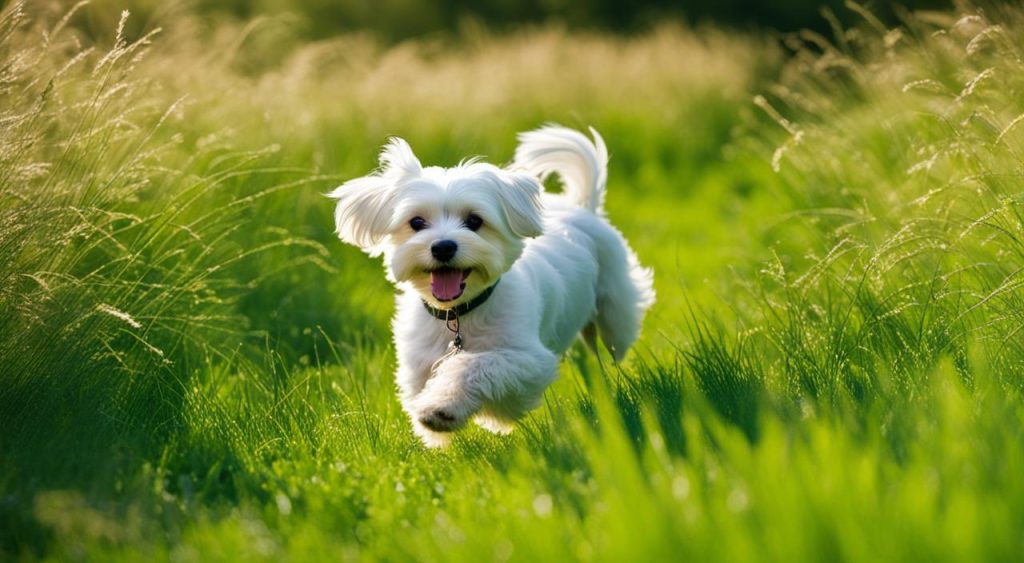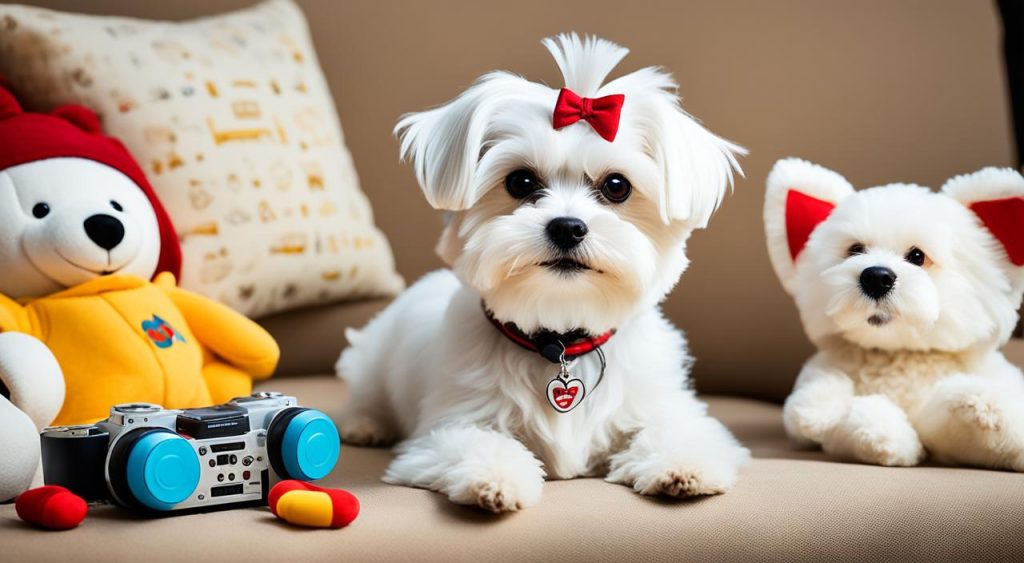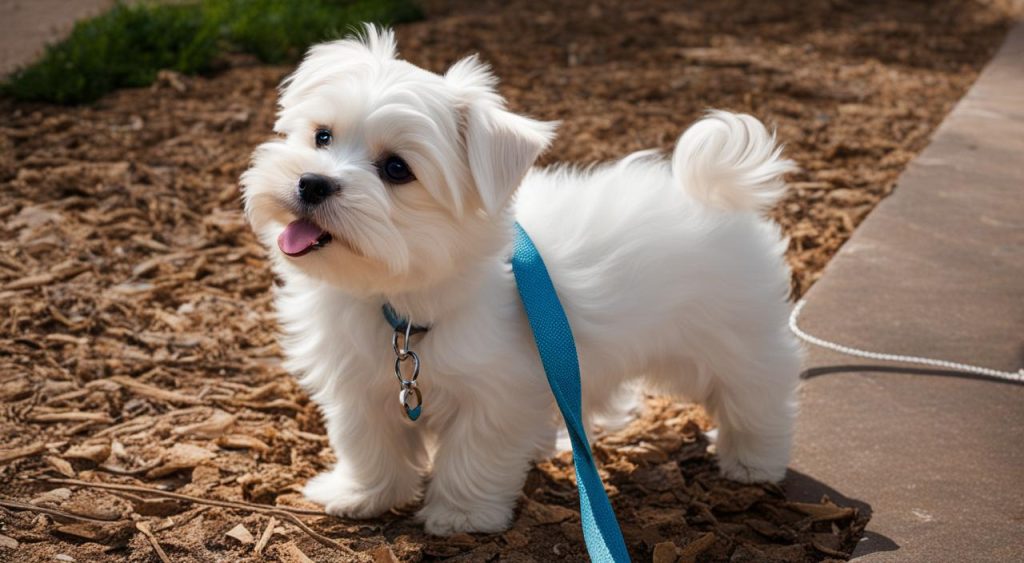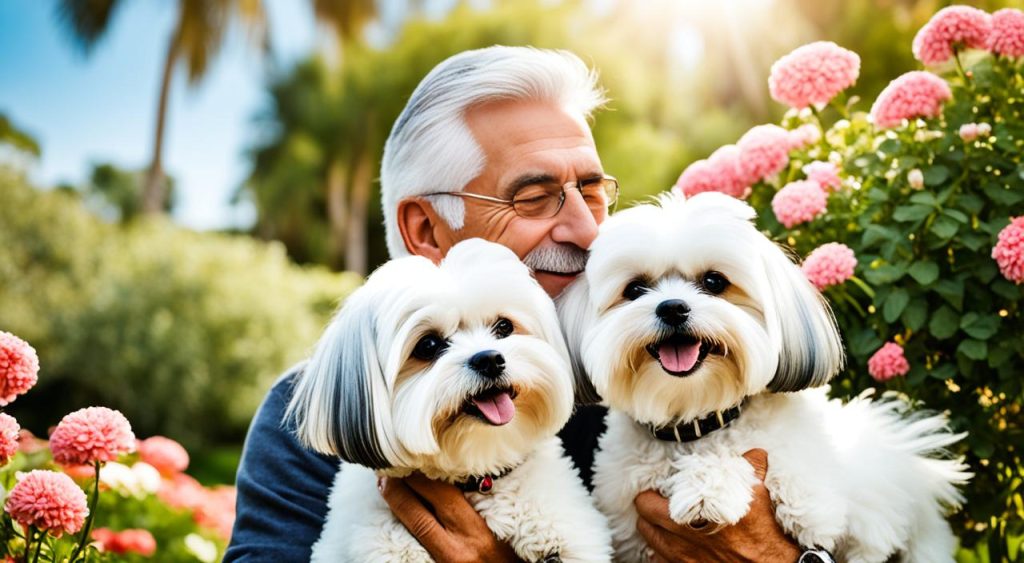The Maltese breed is known for its gentle, brave, and affectionate nature. These intelligent and energetic dogs enjoy spending time outdoors, although they don’t require extensive exercise. Engaging in outdoor activities provides numerous benefits for Maltese dogs, both physically and mentally.
Maltese dogs prefer a moderate outdoor lifestyle that includes frolicking in the backyard and going for medium-length walks with their owners. However, it’s important to note that Maltese dogs are house dogs and should not be left alone outside for extended periods of time.
Outdoor playtime and exercise are essential for keeping Maltese dogs active and healthy. It helps them expend their energy, maintain a healthy weight, and strengthen their muscles. Additionally, being outside provides opportunities for socializing with other dogs and humans, which is crucial for their overall well-being.
Key Takeaways:
- Maltese dogs enjoy spending time outdoors and benefit from moderate exercise.
- Outdoor activities help them stay physically and mentally healthy.
- Maltese dogs should not be left alone outside for long periods of time.
- Outdoor playtime and socialization are important for their well-being.
- Regular exercise helps them maintain a healthy weight and strengthen their muscles.
Physical Description and Breed Standard
When it comes to physical appearance, the Maltese is a small toy breed. They have a long, straight, and silky white coat that is their hallmark. This beautiful coat requires regular grooming to keep it in pristine condition.
The Maltese stands at an average height of 8-10 inches, making them a compact and portable breed. Despite their small size, they have a presence that commands attention and affection.
As for weight, Maltese dogs typically weigh between 6-8 pounds, making them light and easy to carry. Their petite stature adds to their charm, attracting admirers wherever they go.
Furthermore, the history of the Maltese breed can be traced back thousands of years. They were adored by ancient civilizations such as the Romans, Greeks, and Egyptians, who cherished them as companion animals. These dogs were highly valued for their beauty, elegance, and loving nature.
In the late 1800s, Maltese dogs were brought to the United States, where they quickly gained popularity. Today, they are considered one of the most beloved toy breeds, capturing the hearts of dog lovers around the world.
Now, let’s take a moment to appreciate the Maltese’s stunning appearance with this image:
Maltese Temperament and Personality
Maltese dogs are known for their loving and feisty temperament. They have a natural affectionate nature and form strong bonds with their owners. When properly socialized, Maltese dogs are generally peaceful with strangers and get along well with other animals.
However, due to their protective nature, Maltese dogs may exhibit territorial behavior when it comes to their personal space. They may bark at people or dogs who approach too closely without proper introductions. This protective behavior stems from their instinct to guard their loved ones and their territory.
It’s important to note that Maltese dogs have a delicate build and small size, which makes them less suitable for homes with small children. They can be easily injured or mishandled unintentionally. Therefore, it’s important to supervise interactions between Maltese dogs and young children to ensure their safety.
Maltese Dogs and Family Life
“Maltese dogs thrive in a loving and nurturing family environment. They enjoy being a part of the family’s activities and crave attention from their loved ones. With the right care and socialization, Maltese dogs make loyal and devoted companions.”
Maltese dogs are adaptable and can live in various types of households, whether it’s a single-person home, a couple’s residence, or a family with older children. They are well-suited for apartment living as they don’t require extensive exercise and are content with indoor activities.
However, it’s essential to provide them with regular mental stimulation and physical exercise to prevent boredom and ensure their overall well-being. This can include short walks, interactive play sessions, and puzzle toys to keep their minds engaged.
Overall, with their loving temperament and adaptable nature, Maltese dogs can bring joy and companionship to a variety of family setups.
Maltese Health and Grooming
Taking care of your Maltese’s health and grooming needs is crucial for their overall well-being. Here are some important factors to consider:
Life Expectancy
The average life expectancy of a Maltese is 12-15 years. By providing them with proper care and attention, you can help them live a long and healthy life.
Grooming
Maltese dogs have a beautiful long coat that requires regular grooming. Daily brushing is essential to prevent mats and tangles from forming. Additionally, their coat should be washed on a regular basis to keep it clean and healthy.
Health Issues
Maltese dogs may be prone to certain health issues. Some common conditions include patellar luxation, progressive retinal atrophy, and periodontal disease. To minimize these risks, it is important to choose a reputable breeder who follows responsible breeding practices. Regular veterinary check-ups are also crucial to ensure early detection and treatment of any potential health problems.
By prioritizing your Maltese’s health and grooming needs, you can help them enjoy a happy and healthy life by your side.
Maltese Indoor and Outdoor Requirements
Maltese dogs are indoor lap dogs who want to be near their families. They require minimal exercise but enjoy short walks and play sessions. They should not be left alone outside for extended periods of time. Maltese dogs have moderate energy levels and can usually get enough exercise even in small apartments. They are not suitable for extensive outdoor activities but enjoy outdoor playtime in a safe environment.
Maltese dogs thrive in indoor environments and are highly adaptable to apartment living. They are content to be by your side, whether you’re relaxing on the couch or working at your desk. Their small size makes them ideal for small living spaces, and they are known for their cleanliness and lack of odor. However, it’s important to note that while Maltese dogs are indoor dogs, they still require some outdoor time for exercise and mental stimulation.
For indoor exercise, short walks around the neighborhood or play sessions in the backyard are sufficient to meet their exercise needs. These walks provide an opportunity for them to explore their surroundings, socialize with other dogs, and get fresh air. Playing games like fetch or using interactive toys can also keep them mentally engaged. It’s important to remember that Maltese dogs have moderate energy levels and may not require as much exercise as other breeds.
When it comes to outdoor time, it’s essential to prioritize their safety. Maltese dogs should not be left alone outside for extended periods of time as they are vulnerable to extreme weather conditions and potential accidents. They can easily become overwhelmed by larger dogs or wildlife, and their small size puts them at risk of being preyed upon by birds or other predators. Always supervise your Maltese when they are outdoors to ensure their safety.
Summertime Care Tips for Maltese Dogs
During summertime, it is important to take extra care of your Maltese dogs. These small and sensitive pets require special attention to ensure their well-being and comfort in hot weather. Here are some essential care tips to keep your Maltese safe and happy during the summer months:
Protecting Their Nose from the Sun
Maltese dogs have a sensitive nose that can easily get sunburned. To prevent sun damage, consider using a nose balm with UV protection specifically designed for dogs. Applying a thin layer of nose balm to your Maltese’s nose before heading outside can help protect it from harmful sun exposure.
Protecting Their Skin and Coat
The white coat of Maltese dogs is beautiful but can be more susceptible to damage from prolonged sun exposure and hot surfaces. To protect their skin and coat, limit their time in direct sunlight, especially during peak hours. Seeking shade or using lightweight dog clothing with UV protection can also help shield their delicate skin from the sun’s rays.
Protecting Their Paws
Maltese dogs’ paw pads can be sensitive to extreme temperatures such as hot pavement or sand. To prevent burns or discomfort, consider using paw protection products such as booties or wax-based balms. These will help insulate their paws and keep them from getting burned or injured during summer walks or outdoor playtime.
Helping Them Stay Cool
Keeping your Maltese cool is essential in hot weather. Provide them with access to shaded areas or create a sheltered spot for them outdoors. You can also place a cooling mat in their favorite resting area to help regulate their body temperature. Additionally, always have fresh and cool water available for your Maltese to stay hydrated.
Managing Thunderstorm Anxiety
Many Maltese dogs are sensitive to loud noises and air pressure changes, which can trigger anxiety during thunderstorms. Create a safe and comforting environment for your Maltese during storms. Close windows, draw curtains, and provide a cozy hiding spot where they feel secure. Play calming music or use white noise to help mask the sound of thunder. If needed, consult with a veterinarian for additional anxiety management strategies.
By following these summer care tips, you can ensure that your Maltese dogs stay protected and comfortable during the warmer months. Remember to pay attention to their specific needs and adjust their care as necessary to keep them happy and healthy.
Training and Behavior of Maltese Dogs
Maltese dogs are highly trainable and responsive to training. Their intelligence and eagerness to please make them excellent candidates for learning tricks and games. Many Maltese dogs have even excelled in competitive obedience and agility. Training sessions can be a fun and engaging way to bond with your Maltese and stimulate their mental abilities.
However, housebreaking can be a challenge for Maltese dogs. Due to their small size, they may have difficulty controlling their bladder and may need extra patience and consistency during the housebreaking process. It is important to establish a routine and use positive reinforcement techniques to encourage desired behavior.
One common behavior exhibited by Maltese dogs is barking. They have a tendency to bark to express themselves or alert their owners. While this can be endearing, excessive barking can become a problem. It is essential to address the underlying reasons for their barking, such as boredom or anxiety, and provide appropriate outlets for their energy and mental stimulation. Consistent training and positive reinforcement can help redirect their barking behavior.
Another behavior issue that some Maltese dogs may experience is separation anxiety. Maltese dogs are known for their devotion to their owners and can become anxious when left alone for extended periods. To prevent separation anxiety, it is important to gradually acclimate your Maltese to being alone and provide them with mental stimulation and enrichment toys to keep them occupied. Building a consistent routine and ensuring they have a safe and comfortable space can also help alleviate their anxiety.
Overall, consistent training and providing mental stimulation are key to preventing unwanted behavior in Maltese dogs. Their intelligence and eagerness to please make them highly trainable, and with patience and positive reinforcement, you can help them become well-behaved and happy companions.
Conclusion
If you are considering getting a Maltese dog, it is important to understand their specific needs and characteristics. Maltese dogs have a loving and affectionate temperament, making them great companions for families and individuals alike. They enjoy spending time outdoors and benefit from moderate exercise, such as short walks and outdoor playtime. However, they should not be left alone outside for extended periods of time as they are house dogs.
Regular grooming is essential to keep their long, silky coat looking its best. Daily brushing helps prevent mats and knots, and regular bathing keeps their coat clean and shiny. During the summer, it is important to protect their sensitive nose, skin, and paws from the sun and extreme temperatures. Providing shade, extra water, and a cooling mat can help keep them comfortable during hot weather.
Training and behavior management are crucial for a well-behaved Maltese. They are highly trainable and responsive to positive reinforcement. Consistent training can help prevent unwanted behaviors, such as excessive barking and separation anxiety. Understanding their temperament and providing them with mental stimulation can contribute to their overall happiness and well-being.
In conclusion, by taking care of your Maltese dog’s exercise, health, grooming, outdoor needs, and training, you can ensure they lead a happy and fulfilling life. Their loving nature and manageable exercise requirements make them a wonderful addition to any family or individual looking for a devoted companion.





